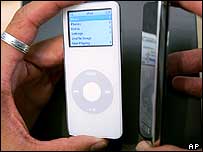|
By Marie Jackson
Education reporter, BBC News
|


The scheme was paid for with savings made on building work
|
College students are to be given free iPods so they can catch up on missed lectures in their own time.
South Kent College in Dover has spent £25,000 on Nano iPods for 250 students in the hope they will listen to podcasts of lectures, as well as music.
Assistant principal Josh Coleman said he had looked to the US and Australia for new ways to encourage learning.
But pressure group Campaign for Real Education said it was wrong to offer bribes and it devalued education.
CRE chairman Nick Seaton said: "Youngsters should want to take the courses for their own sake if they are worthwhile.
"Let the college keep two or three iPods to lend to the youngsters.
"It's a scandalous waste of taxpayers' money."
But Mr Coleman said the MP3 players would only be handed out next month to those teenagers who had completed all their assignments and had full attendance.
The pilot scheme had been paid for with savings made on a building project, he added.
Lectures on IT, motor vehicle engineering and childcare were likely to be the first to be podcast, with scope to make all courses available to download by next year.
Mr Coleman, who is in his second year as principal at the college, said staff had been positive.
'High quality teaching'
Asked if some would rather see a pay rise than the latest technology, he said: "Everybody would like to be paid more.
"At first people thought I was giving iPods out to get people through the door, but they can now see the long-term merits.
"As we attract more full-time students, that generates income which will offset initial outlay, and their wages will go up."
He added that he did not foresee attendance falling as students were given the option of catching up on a missed lecture.
"If they come to college and they get high quality teaching, they will want to come back for more," he said.
Music players are already being used by students at Georgia College and State University in Milledgeville in the US who have found that they have become an integral part of coursework.

~RS~q~RS~~RS~z~RS~51~RS~)